Islam
1/32
There's no tags or description
Looks like no tags are added yet.
Name | Mastery | Learn | Test | Matching | Spaced | Call with Kai |
|---|
No analytics yet
Send a link to your students to track their progress
33 Terms
overview of rabia’s life
• Born about 717 CE and died 802 CE
• Lived all her life in Basra (modern day Iraq)
• Was a celibate ascetic (lived a basic/simple life)
• She debated and taught major religious figures of her time
• Born free, orphaned when young and sold into slavery at her parent’s death
• Freed later in life because of her visible holiness – when her master awoke to find her standing in prayer surrounded by a bright light
Her impact on development and expression (summary)
poems = Her poems demonstrate the importance of having a deep relationship with Allah and a life centred around Him
Founder of the concept of divine love or Mahabbah = Her teachings about Divine Love focused on shifting traditional notions of a fear of God towards a love for God
Provided foundations of Sufism = Sufis believe that the ultimate goal of holiness is to travel an inward path of union with God, which compliments the Shariah, the outward part of the law of Islam → she wrote about in poetry
Contribution: work as leader and teacher
She is considered a leader of mystics and ascetics
Taught about the importance of Tawakkul (total surrender and trust in Allah) →“whoever puts their trust in Allah, then He alone is sufficient for them” (Surah 65:3).
She demonstrated the concept of losing self and material desires see Allah in the world
She encouraged others to surrender their egos and desires, submitting deeper to Allah → through entering a state of uns (a mystical state - a renunciation of wordly things leading to inner contentment)
“Illumine the world, and yourself burn.”
She emphasises the practical works an adherent need to perform to show devotion to Allah
She said to Hasan al-Basri, another ancient Muslim preacher, “Be like a needle, always be working naked”
Contribution: Her writings and poetry
Her writings allowed the reader to experience Allah in a different way
Her writings are used as prayer, allowing people to deepen their connection to Allah
They demonstrate the importance of having a deep relationship with Allah and a life centred around Him: “My hope is for union with thee, for that is the goal of my desire” (My Beloved)
She viewed suffering as an opportunity to deepen a relationship with Allah
Expanded on the principal belief of Al-Qadr: “Those who endure [suffering] will receive Allah’s blessings” (Surah 2:155)
"The source of my suffering and loneliness is deep in my heart" (An Illness without a Worldly Cure) → implies that suffering could lead to reflection and a closer relationship with the divine
Her writings emphasised the inward path one must travel to connect with Allah: “O Allah, I can’t live in this world without remembering you” (My Greatest need is You)
Contribution: Teaching of Divine Love (Mahabbah)
She is the founder of the concept of divine love
Shifted the traditional notions of a fear of Allah towards a love for Allah.
True love for Allah should be for His own sake, not for the rewards of paradise or the fear of hell
“If I adore You out of fear of Hell, burn me in Hell! / If I adore you out of desire for Paradise” (If I Adore You)
“Then Allah will bring a people, he shall love them, and they shall love him” (Surah 5:54)
Her writings allowed her to shift in many people’s ideas about Allah.
This divine love is also the foundation of love for other creatures in the universe because loving Allah for his own sake involves loving what he has made. environmental ethics
Impact: Her ascetic lifestyle is a model for the submission to Allah
Her life is now used as a model for Muslims to follow
She renounced worldly pleasures (entering a state of uns), emphasising her intense relationship with Allah
She taught that world pleasures were temptations of the devil
Believed they distracted adherents from deepening their relationship with Allah
“May God deprive you of all that which deprives you from God.”
“Renounce the world and Allah will love you, and renounce what the people possess” (Hadith 31:40)
She lived a life of celibacy to focus solely on spiritual pursuits
She refused marriage proposals since she believed only Allah’s love was necessary: “For His love I can find no substitute” (My Beloved)
Believed that a husband would distract her from Allah
She expressed her love for Allah through prayer
She also prayed at night for the forgiveness of sins
She performed 1,000 ritual prostrations in prayer every day, saying that “Your prayers are your light; Your devotion is your strength”
She fasted regularly to emphasise her self-discipling and to show her reliance and devotion to Allah: “Your Name on my tongue is the sweetest” (My Greatest Need is You)
Impact: The teachings in her writings impacted on expression of Sufism
Her writings provided foundations for the development of Sufism, the mystical dimension of Islam, and she is considered to be one of the most influential Sufi forerunners, evident in how she is considered a Saint today.
Sufis believe the ultimate goal is travelling an inward path to union with Allah: “The striving after union with thee has healed my soul” (My Beloved) → emphasises building a connection to Allah
Many central beliefs and practices in Sufism have roots in Rabia’s poetry, guiding Sufis on their tariqa (the journey to knowing Allah)
Her poetry demonstrated the importance of Muraqabah (meditation) in deepening one’s connection to Allah: “My peace… is my solitude” (Her poem, My Beloved)
She taught that by practicing Muhasabah (self-reflection), nafs (ego, greed) can be controlled and thus Sufis can be further devoted to Allah: “In my soul there is… a mosque… where I kneel” (In My Soul)
She demonstrated Ihsan (spiritual excellence), an ideal strived for by Sufis, since her poetry continually worshipped Allah
An extension of the concept of Taqwa
Obtaining Ihsan by seeking to surrender to Allah and worshiping Allah as much as possible
Impact: Seen as a spiritual interpreter, impacting how Muslims should view their relationship with Allah
Her teachings allowed adherents to experience Allah in a new way Her teaching of Mahabbah (Divine Love)
Revolutionary at the time → shifted the prevailing view from fear to love
“O Allah, I can't live in this world without remembering You” → demonstrates her love for Allah, which models how Muslims should treat their relationship with Him
The prevailing view was that adherents should live in fear of Allah and punishment
She emphasised that adherents should love Allah because of his love for the world
From her perspective, the fact that she existed was proof of Allah’s abundant love
This is widely accepted by adherents today
She taught that actions should be motivated by building a relationship with Allah rather than for reward in paradise
“First the Neighbour, then the House” (Quote attributed to Rabi’a) → means focus on your relationship with Allah before paradise
This is the model for how adherents should approach their relationship with Allah.
What is sufism
Sufism – a mystical expression of Islam
One path to become closer to Allah → about building deeper connections and faith
Constant connection to Allah instead of becoming connected after death
Master-disciple relationship with Allah
Goal to have a loving relationship with Allah and devote life to him → receive revelations in return
Tariqa – the journey to knowing Allah
By practicing self-effacement (modesty) and controlling nafs (ego)
Obtained by living an ascetic lifestyle → little comfort and luxuries
Describe and explain Islamic ethical teachings on environmental ethics
Ethical Teachings provide a framework that allows adherents to act morally and in a way that aligns with their beliefs
Islamic Jurisprudence - The process of making ethical decisions by using sacred texts (hadtih + quran) and ijma
Teachings and sources form the fundamental framework that allow adherents to make ethical decisions
The Quran – word of Allah (most important)
The Hadith – words and actions of the Prophet Muhammad (2nd most important)
Institutions, Organisations (Ijma) – advice from Islamic scholars give contemporary context
Teachings:
The Greatness of Allah and His Creation
Kalifa and Amana
The Greatness of Allah and His Creation
Believe that the environment is an ayat (divine sign from Allah, conveying guidance, wisdom, and laws) since it is how Allah reveals himself and his greatness
Allah has created earth, and humans should see that all of the animals and plants in nature are signs of Allah
“His signs is the creation of the heavens and earth and [the] creatures” (Surah 42:29)
Since the earth is made by Allah, adherents must worship it and treat it as sacred → EARTH MUST BE TREATED WITH REVERENCE (TAQWA)
“The whole earth has been created a place of worship” (Hadith 2:169)
The earth’s resources must be used responsibly
“Whoever kills a sparrow… without a just cause, Allah will hold him accountable”. (Hadith 43:4451)
Kalifa and Amana
Means Trusteeship and Stewardship
Believe that Allah gave humans the role of khalifa (stewards),
and Allah has Amana (trust Allah has in adherents) to fulfil this duty
Since Allah created the earth, He has placed His trust in humanity to maintain and sustain creation
“It is He Who has made you successors upon the earth” (Surah 6:165)
Earth is the property of Allah, and humans are the caretakers of it
Earth must be treated with respect
Humans are not above the earth
“The creation of the heavens and the earth is indeed greater than the creation of mankind” (Surah 40:57)
Allah encourages sustainability and maintaining resources for the future
“Whever plants a tree is rewarded by Allah as much produce as grown in that tree” (Hadith 135:13)
Applications of Kalifa and Amana
Muslim adherents have a duty to act against the current issue of animal cruelty because they are entrusted to sustain creation by caring for animals, which are signs of Allah.
Animals in Islam is a non-for-profit organisation funded by PETA aiming to promote Halal living and educate Muslims about the excessive animal cruelty in the meat industry.
They provide recipes, shopping tips and a list of halal products to encourage Muslim adherents to be mindful consumers and ensure their purchases do not contribute to animal abuse, because “all animals are devoted creatures of Allah… Practices on today’s industrial farms… should be considered… makrooh (abominable)” (Animals in Islam, n.d.).
This organisation reflects the ethical teaching of stewardship (khalifa) and trusteeship (amana), because they are fighting against the unethical treatment of animals.
Applications of the greatness of allah + his creation
An ethical issue this applies to is global warming.
Since human actions causing global warming is causing the earth to be destroyed and making it harder for Allah’s creatures to survive
This goes against the teaching that the earth is an ayat (a sign of Allah’s greatness), since not encouraging responsible treatment and highlight’s human’s lack of reverence for Allah’s creation.
Thus, Muslim adherents must fight against this issue.
The Islamic Declaration on Global Climate Change (IDGCC) was held in 2015 by Islamic leaders worldwide to support action against climate change and promote sustainability in order to protect the integrity of Allah’s creation: “Human beings are created to serve the Lord… to work the greatest good we can for all the… generations of Allah’s creatures” (IDGCC, 2015).
It calls on Muslims worldwide to do their part to phase out greenhouse gas emissions and commit to renewable energy sources to fight global warming and climate change, thus reflecting this ethical teaching of the greatness of Allah and His creation.
Hajj description
The Hajj is one of the five pillars of faith in Islam and is considered “fard” (obligatory).
It is a one weeklong pilgrimage to Mecca that happens 2 months and 10 days after the Holy Month of Ramadan.
Every adherent is expected to undertake at least once in their lifetime.
However, for those who are physically or financially unable, having niyyahh (the intention) will suffice.
There are three types of Hajj, but the most common one is the Hajj-ul-Tamattu.
Purpose of Hajj
• Submitting to Allah
• Unifying the Umma (Muslim community)
• Cleansing oneself and overcoming temptation
Importance of Hajj
allows muslims to fully submit to allah and fulfil the 5th pillar of faith → through the ritualistic steps and how that expresses principal belier
1st step
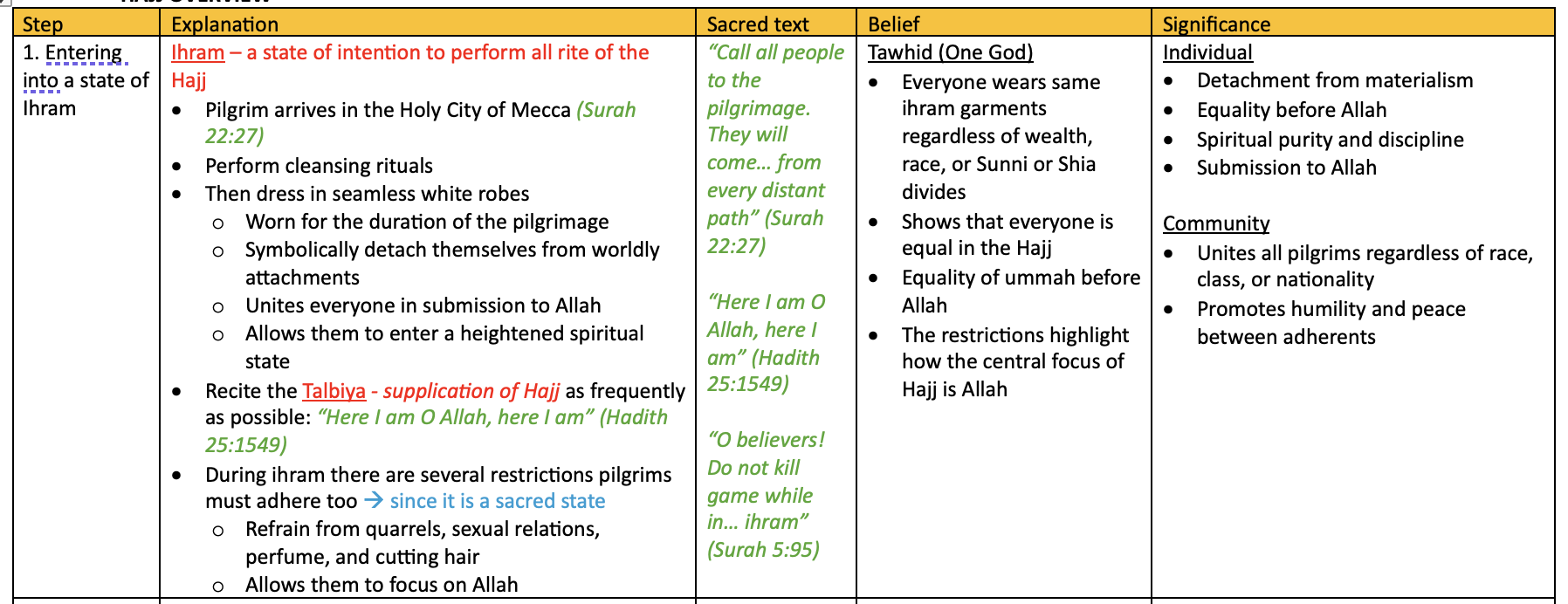
2nd step
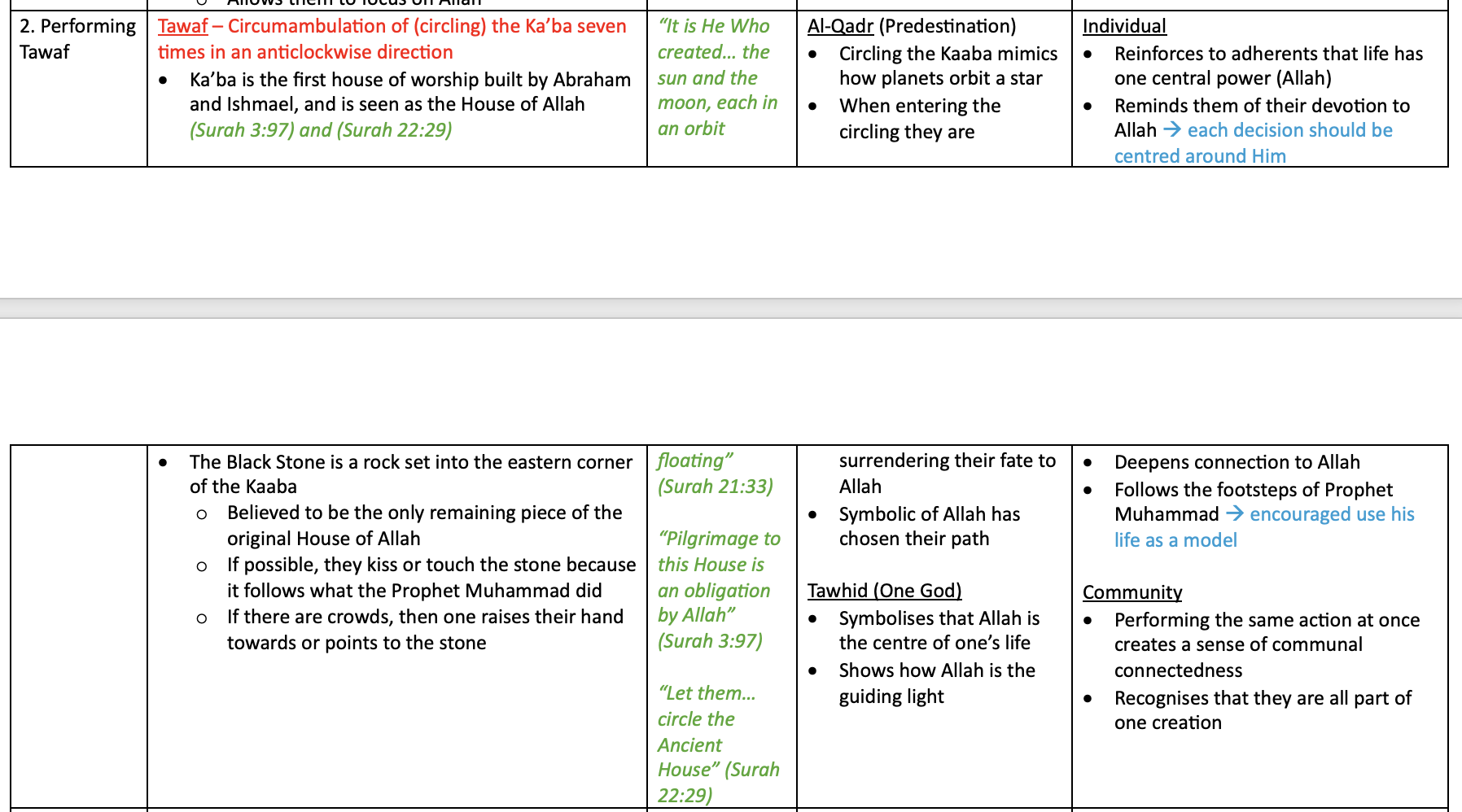
3rd step
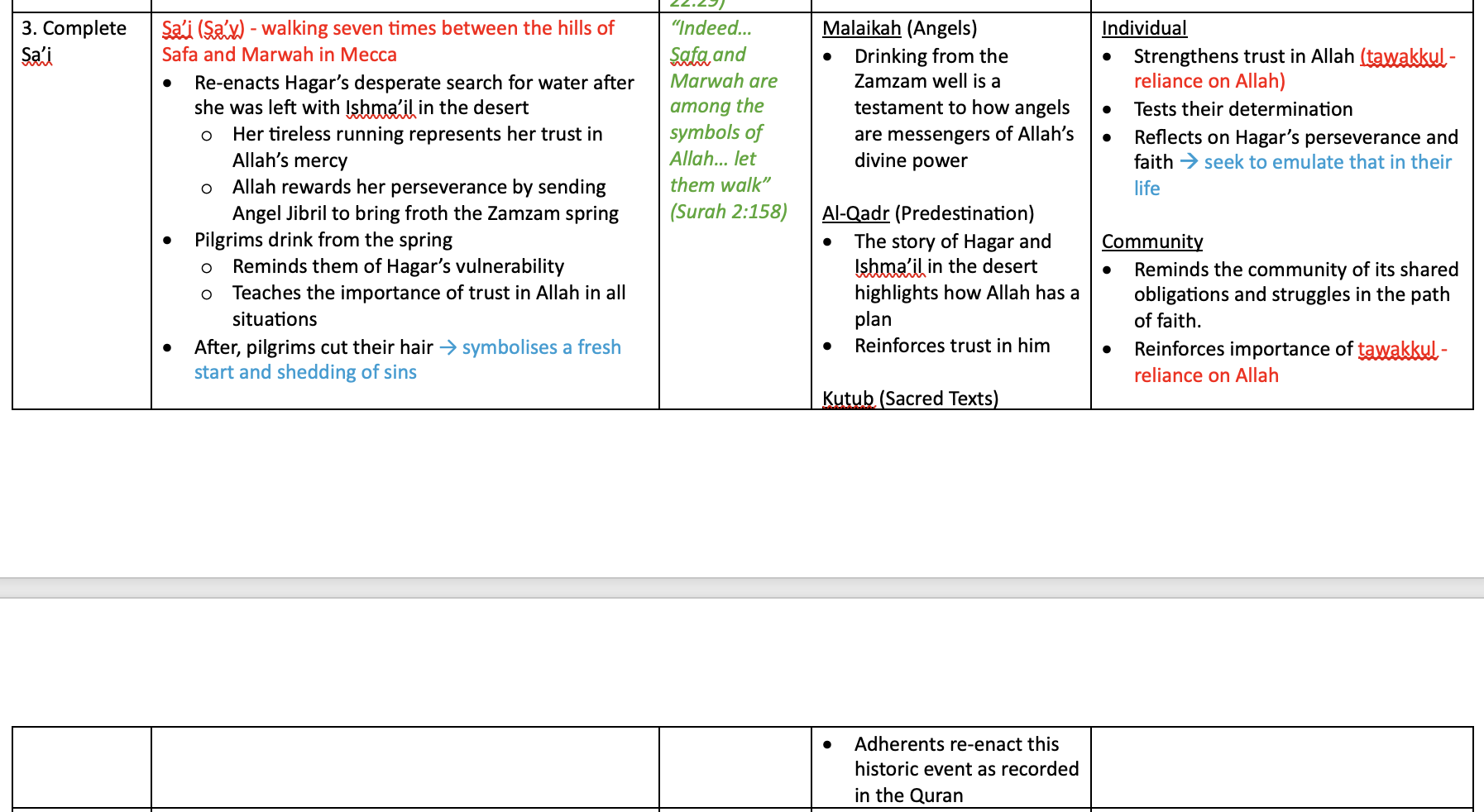
4th step
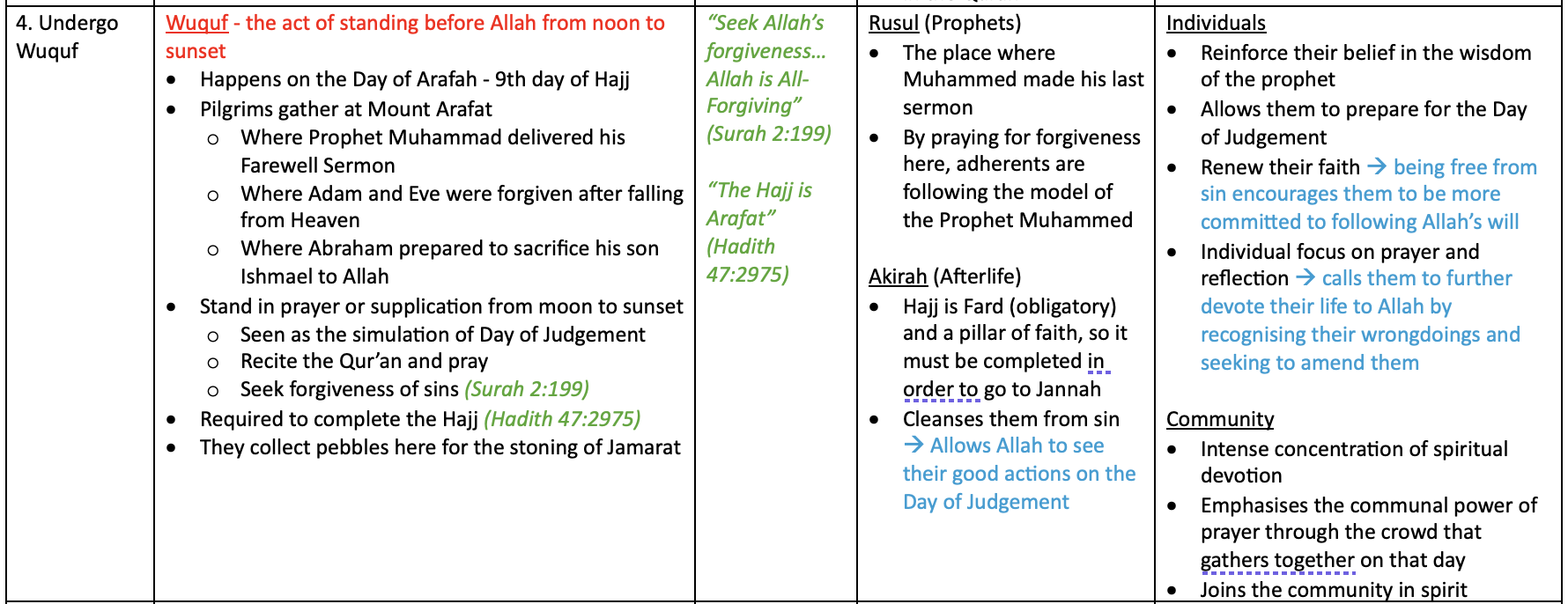
5th step
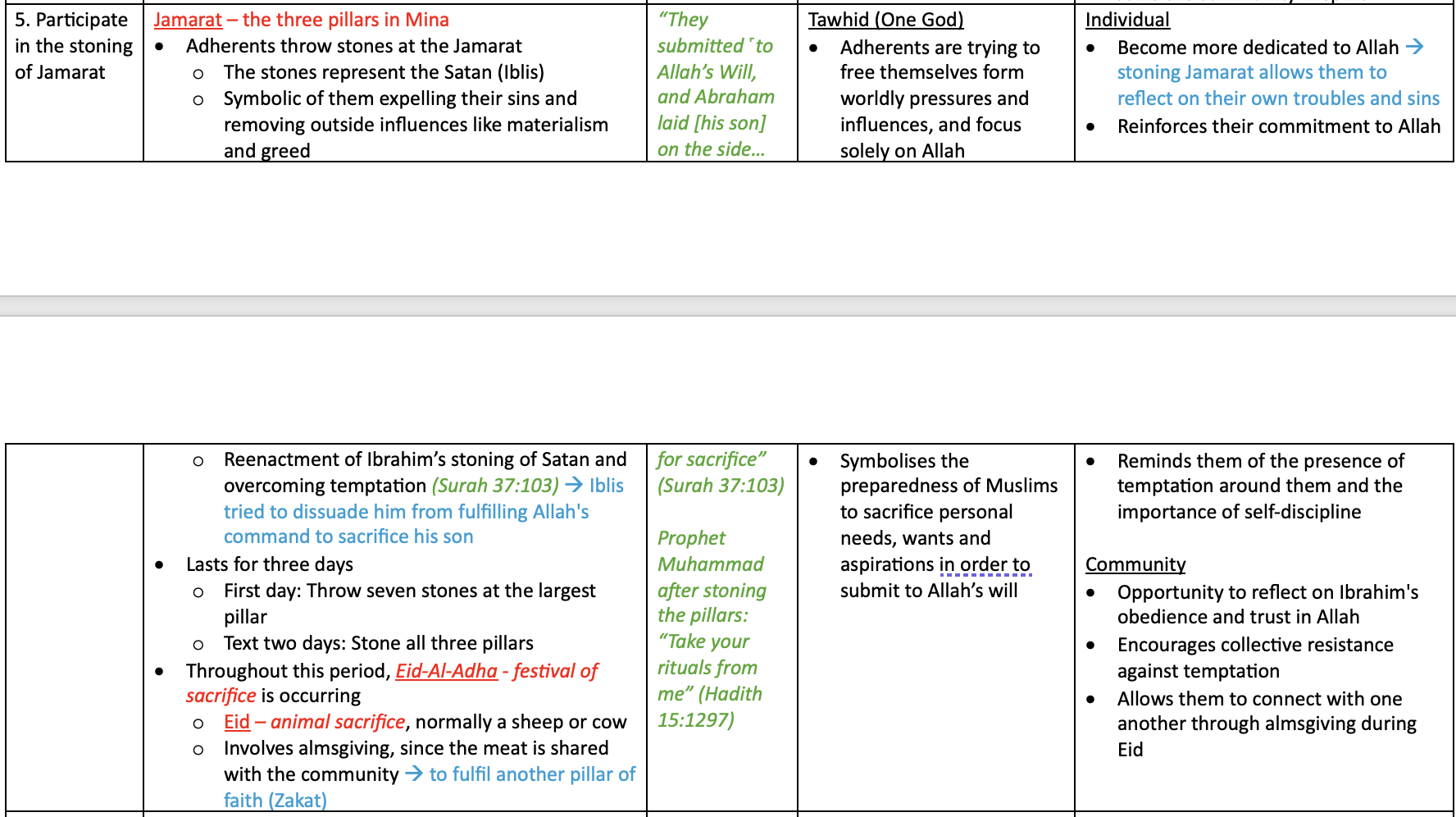
6th step

Demonstrate how this practice expresses the beliefs of Islam
tawhid
Tawhid is the belief in monotheism, and that there is one Allah, who is all-knowing and omnipresent.
Reflected in the garments worn when entering Ihram.
Everyone wears same ihram garments (white, seamless robes) regardless of wealth, race, or Sunni or Shia divides, to show the equality of the Ummah before Allah and during the Hajj.
The restrictions that adherents must comply with after entering the state of ihram, like no quarrelling, cutting hair or wearing perfume
highlights how the central focus of the Hajj is Allah:
“O believers! Do not kill game while in… ihram” (Surah 5:95).
Performing Tawaf (the circumambulation around the Ka’ba in Mecca seven times in an anticlockwise direction) after entering ihram
emphasises that Allah is a guiding light at the centre of everything that a Muslim adherent does.
The stoning of Jamarat after completing Sa’i
reinforces how Allah is above everything
adherents are trying to free themselves form worldly pressures and influences and focus solely on Allah by throwing rocks at the three pillars symbolising the temptations of Iblis.
Demonstrate how this practice expresses the beliefs of Islam
Rusul
The step of Wuquf, where pilgrims supplicate and pray for forgiveness at Mount Arafat on the Day of Arafah reflects the belief in Rusul (the prophets).
Mount Arafat is thought to be the place where Muhammed made his last sermon, and praying at Arafat is considered one of the most crucial parts of the Hajj, as stated by the Prophet himself
“Hajj is Arafat, if Arafat is missed, then the whole hajj is missed” (Hadith 47:2975).
By praying for forgiveness here, adherents are following the model of the Prophet Muhammed, thus expressing the belief in Rusul.
Demonstrate how this practice expresses the beliefs of Islam
Al-Qadr
The Hajj expresses the belief in Al-Qadr (fate or predestination)
circumambulating the Ka’ba during Tawaf mirrors how the planets orbit the sun in the solar system
symbolising adherents surrendering their fate to Allah’s chosen path
“It is He Who created… the sun and the moon, each in an orbit floating” (Surah 21:33)
completing Sa’i
highlights the importance of trusting Allah and his mercy since adherents
mimic the story of Hagar and Ishma’il in the desert, learning that Allah always has a plan.
Analyse the significance of the Hajj → TOPIC SENTENCE
The Hajj, as one of the Five Pillars of Islam, holds profound significance as it embodies a Muslim's commitment to submit to the will of Allah.
By undertaking the rituals of Hajj, Muslims demonstrate their obedience to Allah, strengthen their spiritual connection, and affirm their place within the global community of believers: “Call all people to the pilgrimage. They will come… from every distant path” (Surah 22:27).
+INTRODUCE TOPIC SENTENCE
significance for individual
Demonstrate their submission to Allah
Undertaking the Hajj carries immense significance for individual Muslim, as it reflects their devotion to the Quran and their pursuit of submission to Allah's will.
The five pillars of Islam are considered as foundational as they guide the Muslim in the way of submission to the will of Allah, which is the essence of Islam.
Undertaking the Hajj with niyyahh (sincere intention) is necessary to submit more fully and perfectly to Him.
Entering state of Ihram can be very demanding due to the restrictions it imposes, like not being allowed to argue, have sexual relations.
However, this acts as a physical representation of the adherent’s willingness to turn themselves to Allah and commit to the Hajj: “Here I am O Allah, here I am” (Hadith 25:1549).
The purpose of entering Ihram is to focus on Allah alone, allowing the pilgrim to fully submit to His will.
Performing Tawaf (circumambulating the Ka’ba seven times) also reminds them of their devotion to Allah and how each decision should be centred around Allah: “Let them… circle the Ancient House” (Surah 22:29).
+LINK SENTENCE
significance for individual
Allows them to renew their faith by being cleansed of sins
Additionally, completing the Hajj forgives adherents’ sins, allowing them to undergo a complete spiritual transformation: “Whoever performs Hajj for Allah's pleasure… will return as if he were born anew." (Hadith 25:1521).
The physically and spiritually demanding nature of the Hajj allows pilgrims to reflect in order to renew their faith.
The names “Hajji” and “Hajjah” given to adherents who have completed it emphasises their spiritual renewal.
The cutting of hair after completing Sa’i represents their fresh start
Ehen performing Wuquf at Arafat individual focus on prayer and reflection: “Seek Allah’s forgiveness… Allah is All-Forgiving” (Surah 2:199).
Mount Arafat symbolises Allah’s forgiveness since it is where Adam and Eve were forgiven after falling from Grace.
Wuquf calls pilgrims to further devote themselves to Allah by recognising their wrongdoings and seeking to amend them.
This is reinforced by the stoning of Jamarat
individuals become more aware of the presence of temptation around them and encourage them to avoid sinful actions in the future.
The Hajj allows adherents to renew themselves spiritually.
+LINK SENTENCE
significance for individual
Allows them to enter Jannah
Finally, completing the Hajj is compulsory for pilgrims to enter Jannah.
The Day of Judgement occurs after death and determines whether the adherent goes to Jannah (akin to heaven) or Jahannam (akin to hell).
One goes to Jannah when they have lived a life that is centred around Allah and following his will: "Your good actions will benefit only you, while evil harms only the person who does it." (Surah 41:46).
Without completing the Hajj, it is impossible to go to Jannah, since it is one of the five pillars of faith and is considered fard (obligatory): “Pilgrimage to this House is an obligation by Allah” (Surah 3:97).
This is because the pilgrimage demonstrates the Muslim adherent’s tawakkul (reliance on Allah) and that they actively following His will, reflecting their belief in Al Qadr.
The drinking from the Zamzam spring when completing Sa’i
reflects Hagar’s perseverance and faith in Allah when searching for water in the desert.
they are encouraged to emulate Hagar’s trust in Allah, which is necessary for going to Jannah.
+LINK SENTENCE
for the community (ummah)
Builds a sense of community
Hajj creates a feeling of brother and sisterhood amongst all the pilgrims, since they are all gathering for the same purpose: Submission to Allah.
When completing the Hajj, Adherents are united with their equal intentions to Allah.
Since all pilgrims must wear the same ihram garments, they are called to focus on what they have in common, rather than what divides them.
When circumambulating the Kaaba during Tawaf
performing the same action creates a sense of communal connectedness
since all pilgrims present recognise, they are all part of one creation: “Let them… circle the Ancient House” (Surah 22:29).
When performing Wuquf, large crowds form at Mount Arafat to pray.
The intense concentration of spiritual devotion joins the community in spirit and unites them in the hope of forgiveness of sins.
emphasises the communal power of prayer and contributes the sense of community that is created during the Hajj.
+LINK SENTENCE
for the community (ummah)
Reminds the community of their shared goal of submitting to Allah
Additionally, the Hajj reminds the ummah of their shared goal of submitting to Allah and unites them in support one another on their faith journey.
The communal nature of the steps of the Hajj encourages the community to collectively deepen their faith.
Completing Sa’i is physically demanding, but the community feels encouraged by the presence of others to continue.
This reminds the community of its shared obligations to each other and themselves, as well as struggles in the path of faith.
However, the presense of the community can more powerfully reinforce the importance of tawakkul (reliance on Allah) and remind them of their shared goal.
The stoning of Jamarat is an opportunity for communal reflection on Ibrahim's obedience and trust in Allah: “They submitted ˹to Allah’s Will, and Abraham laid [his son] on the side… for sacrifice” (Surah 37:103).
encourages collective resistance against temptation
being surrounded by others in completing the same action encourages them to submit further.
+LINK SENTENCE
for the community (ummah)
Fosters tolerance and respect
The Hajj fosters tolerance and respect amongst the community.
Since Hajj is undertaken on such a large scale, the community witnesses the diversity of Islam, thus encouraging the ummah to come together in tolerance and respect.
The Quran forbids discrimination based on race and the Hajj provides a powerful witness to this fundamental element of Islam: “People are all the children of Adam” (Hadith 355:3955).
The Hajj encourages racial harmony in the ummah
since it brings people of different ethnic backgrounds together in a common act of submission to Allah
“Call all people to the pilgrimage. They will come… from every distant path” (Surah 22:27).
The festival of sacrifice (Eid) that occurs in the three days of the stoning of Jamarat
allows the ummah to connect with one another through almsgiving
since pilgrims must make a sacrifice and share it with the community.
Through this, the Hajj encourages intercultural understanding by sharing with people of different backgrounds.
+LINK SENTENCE